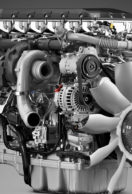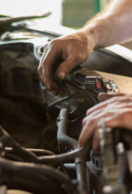Now that the warm weather is clearly on its way, you're likely thinking of ways to enjoy the sun. While sunbathing in your backyard could be a safe option, you may also be planning a cottage visit or a road trip with family or friends.
While soaking up some Vitamin D from the sun's soothing rays is good for the body and soul, your car's engine won't appreciate the heat in quite the same way. To make sure your car stays cool and gets you where you need to go, take the following preventative steps so you can skip the repair shop and enjoy your summer.
Let's explore why engines overheat and what's happening when they do.
Why Do Engines Overheat?
Car engines have an optimal temperature range for performance. If your engine becomes either too hot or too cold, it can cause issues. If your car's engine temperature rises higher than this optimum range, it can overheat.
Several factors can lead to your car overheating, but it's commonly caused by a cooling system leak, blockage, or a shortage of coolant. When the cooling system is malfunctioning, it won't allow enough heat to leave the engine compartment, leading to overheating.
Driving in sweltering weather is another common cause of overheating. Or, you could be experiencing a failing thermostat or water pump. Car parts such as gaskets and rubber hoses can also leak through wear and tear, often caused by driving in stop-and-go traffic on a hot day.
What Are the Signs Your Car is Overheating?
The first sign that your car engine is overheating is the telltale steam rising out from under your car's hood. Or, you may notice your temperature gauge steadily climbing from the comforting level of 'C' for cool. To reduce the chances of this happening, you can take certain preventative measures.
Preventative Measures to Keep Your Engine Cool
As in modern medicine, preventing your car engine from overheating is better than the cure. To avoid getting stranded at the side of the road and costly towing and repair bills, take these steps to prevent your car engine from overheating.
Regularly check your temperature gauge while driving. If you see it start to climb, take these immediate steps to help it fall back down.
Turn your heat and fan on full. This will pull some of the excess heat out of the engine block.
Turn off the air conditioner. This will reduce engine strain.
If possible, stay off the brakes, put the car in park, and rev the engine. These steps will help get water and air circulating through your radiator.
Always carry extra coolant in your car. If the above steps don't work, pull to the side of the road so you can check your coolant level and top it up if it's low. Be sure to use the correct mix of antifreeze and water.
If you notice any coolant leaks, have a mechanic fix the problem right away. Albuquerque's own All In The Wrist Auto Repair offers the very best at diagnosing and fixing any problems your vehicle may have.




